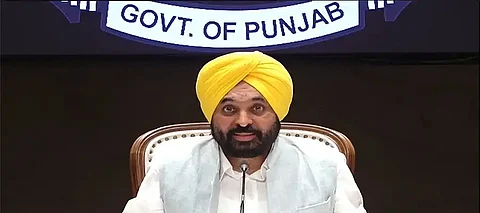

The Punjab government, under Chief Minister Bhagwant Mann, is planning to table a new Bill in the state assembly that could sentence sacrilege—intentional desecration of religious books—to death. This proposal, to be tabled in a July 10-11 special session, is the third attempt in recent times by Punjab to make sacrilege more punishable, an indication of the intense popular outrage and political delicacy around such crimes since the 2015 Bargari one.
Sacrilege is a term used to describe acts that insult or defile sacred religious books or sites. In Punjab, these acts have time and again precipitated mass protests, social turmoil, and even mob lynching, particularly since the desecration of the Guru Granth Sahib in 2015.
Most people in the state believe that the current laws, which mandate up to 10 years of imprisonment for such offenses, are not stringent enough and do not deter criminals.
The new Bill seeks to provide the most severe punishment so far: capital punishment (death penalty) for whoever is convicted of sacrilege of any holy book, including the Guru Granth Sahib, Quran, Bible, or Bhagavad Gita. The government is already taking legal advice so that the law will pass the constitutional challenge, following previous attempts being thwarted by the central government due to worries about equity and consistency with national law.
Previous governments, Congress, and SAD-BJP, attempted to pass such legislation—first by suggesting life imprisonment, then widening the ambit to include all religions following the Centre's objections to targeting the Sikh scripture.
But those bills were either rejected or kept on the backburner as they proposed amending the now-superseded Indian Penal Code (IPC). The proposal of the Mann government will be in consonance with the new Bharatiya Nyaya Sanhita (BNS), India's revised criminal law code.
Legally, this Bill has significant constitutional issues. India's criminal justice system is founded on the grounds of equality, due process, and proportionality of punishment. The Supreme Court has consistently considered that the death penalty must be left for the "rarest of rare" cases, generally murder or terror. Elongating it to sacrilege may establish a questionable precedent and can also be challenged legally.
Socially, the Bill captures the deep emotions and sensitivities surrounding religion in Punjab. While attempting to guard religious sentiment and avert unrest, critics fear that such repressive laws can be abused, potentially causing wrongful convictions, mob justice, and further undermining due process. Cases in Pakistan, where the laws against blasphemy have been used to cause violence and miscarriage of justice, are commonly used as cautionary examples.
The decision is made while protests, including a hunger strike by an individual seeking harsher punishment for sacrilege, are continuing and there are increasing fears about law and order if the matter is not addressed. The government is hoping that strong legislation will help restore public confidence and discourage the recurrence of such acts.
The government of Punjab wishes to enact legislation that would impose the death penalty on individuals for deliberately showing disrespect to any religious book. Although this is intended to guard against hurting religious sentiments and ensure peace, it also poses difficult questions regarding justice, potential abuse, and whether such a severe penalty would be suitable for the offense in a modern legal system.